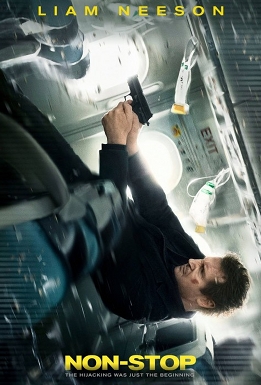If I told you that Non-Stop was a pulse-pounding, edge-of-your-seat thriller that will blow your mind—in every way, would you believe me? Of course, you would.
There’s a reason why a movie like Non-Stop is released in February and not in December for the Oscar season. It’s meant to be a “fun” but far-fetched popcorn movie. Granted, some critics may come out and bash the movie for being incredibly bad, but I’ve seen worse.
And while there are many avenues you could take to tear this movie apart, there’s one area that almost saves this movie from total engine failure—casting. Without the solid acting talents that the filmmakers assembled (led by Neeson, Moore, and Stall), Non-Stop would be the best unintentional comedy of the year so far (it’s already in my top three, Pompeii is number one).
For whatever reason, Liam Neeson continues taking on roles about men in the midst of a mid-life crisis that stem from daddy-daughter drama. But no matter how didactic the film portrays his tortured soul, it is his greatness as an actor that draws sympathy from us in an authentic way. And Hollywood’s smart enough to spot that because audiences are responding to it.
Neeson stars as a weary U.S. Air Marshall who gets a mysterious text while on his flight to London that puts everyone onboard at risk. Where the film goes wrong is its confusion on whether it wants its plot to remain a mystery or not. The movie tosses several red herrings at us so we can solve who the real villain is. However, it pays homage to Source Code by giving it away too early in a scene that’s meant to be mundane and subtle. Yet the film also wants to shower us with clues so that we know that the screenwriters gave us a “proper arc and backstory” on a character we never expected. SPOILER ALERT: it doesn’t help.
The ultimate reasons as to why there’s a threat on the plane is lame and borrows its character motivation from the train bomber in Source Code. The movie goes from far-fetched popcorn movie to trying to be a film that’s actually trying to say something. Why try and give us weak subtext, post-9/11 commentary, and a study on racial stereotypes when the main reason this was made was so the world could see Liam Neeson show off more of his special set of skills.
This is essentially Taken but on a plane—and this time, Neeson doesn’t have to travel all over Europe to save his daughter or the world. All he has to do is go from first class to coach.

